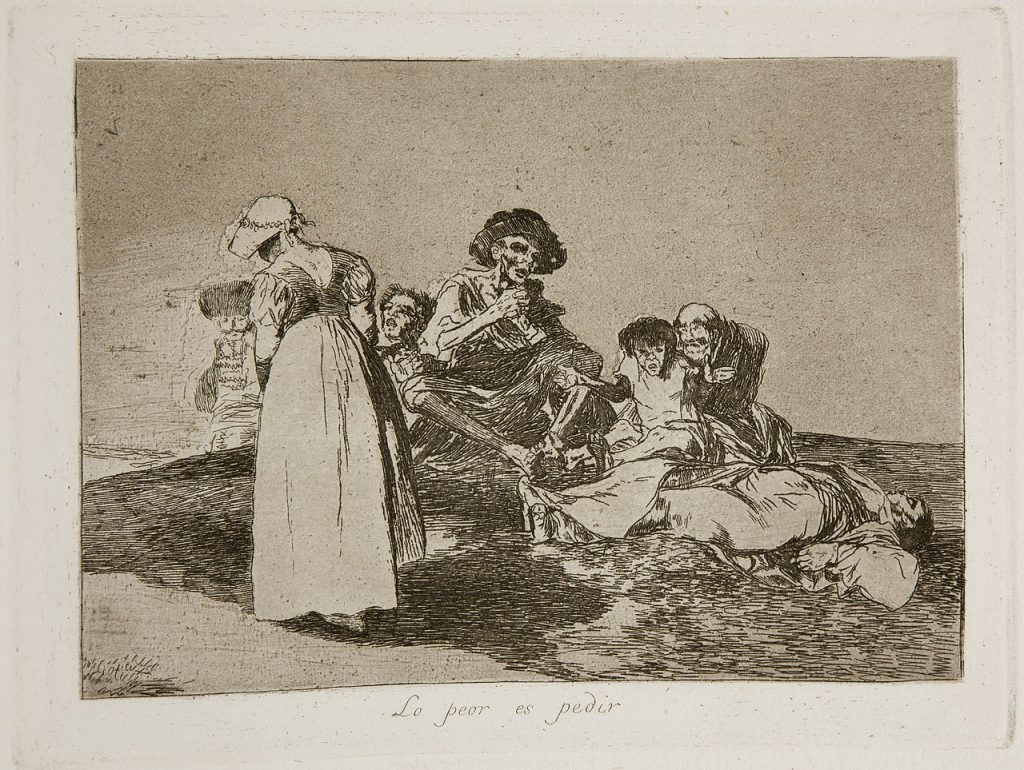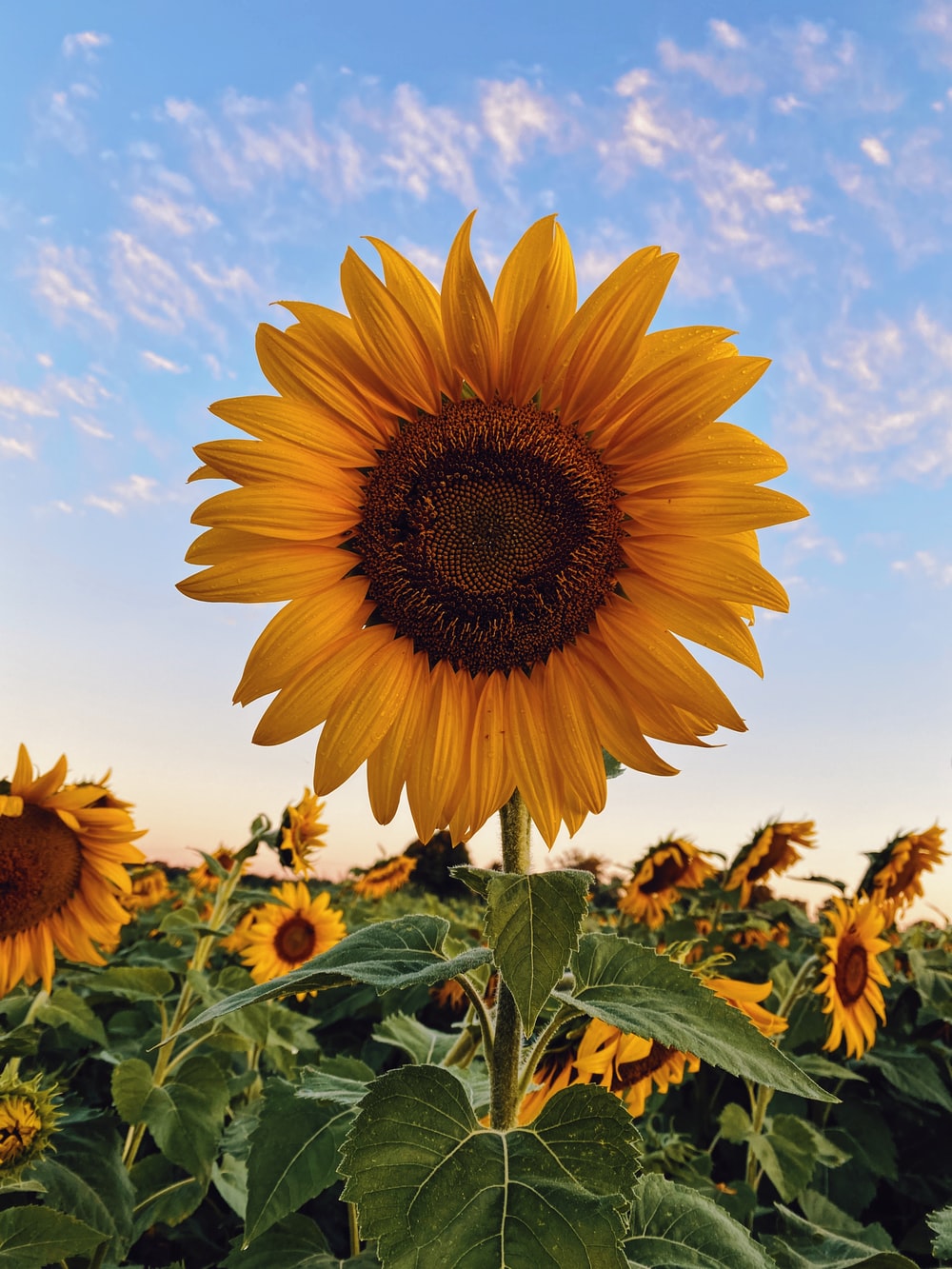“Believe in truth. To abandon facts is to abandon freedom. If nothing is true, then no one can criticize power, because there is no basis upon which to do so. If nothing is true, then all is spectacle. The biggest wallet pays for the most blinding lights.”
–Timothy Snyder, On Tyranny: Twenty Lessons from the Twentieth Century
“There is simply too much injustice in the world. And too much remembering (of ancient grievances: Serbs, Irish) embitters. To make peace is to forget. To reconcile, it is necessary that memory be faulty and limited.”
-Susan Sontag, Regarding the Pain of Others
Following the daily news grind with its explicit images of war, can be emotionally draining. In a relentless “live” news cycle, the immediacy becomes almost numbing. Being stressed or unable to concentrate is an understandable result.
In the 1981 experimental novel Easy Travel to Other Planets, the term “information sickness” first appeared. The symptoms of this futuristic disease included “bleeding from the nose and ears, vomiting, deliriously disconnected speech, apparent disorientation, and the desire to touch everything.” The current rage of dystopian novels is partly the result of our “age of spectacle.” One result of war is the creation of a shelter and refuge for art. Great artworks are usually the first to be placed safely underground, as the artwork’s survival becomes linked to our own.
Regarding the Pain of Others is a book about war photography, and was Susan Sontag’s last book written before her death. The book opens with the Crimean War in 1855, where Roger Fenton made the earliest field photographs ever taken in wartime. 235 of his images are available for viewing at the Library of Congress. There are no images of combat or dead soldiers in Fenton’s work, due to the slowness of the camera lens, long exposure times, and Victorian propriety. One of the most often reproduced photos by Fenton is titled “The Valley of the Shadow of Death” which shows a ravine covered in cannon balls, an image which Sontag thought was “set up” by Fenton.
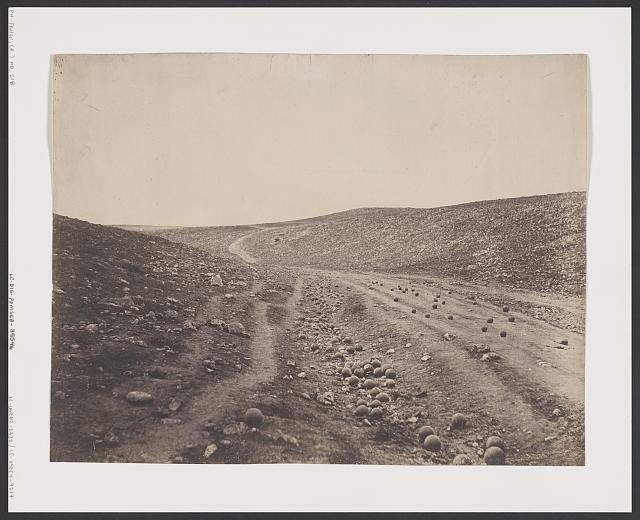
Sontag claimed an “ethical value of an assault by images.” Their value lies “To steel oneself against weakness. To make oneself more numb. To acknowledge the existence of the incorrigible.” For Sontag, photography could be a call to action:
People don’t become inured to what they are shown – if that’s the right way to describe what happens because of the quantity of images dumped on them. It is passivity that dulls feeling. The states described as apathy, moral or emotional anesthesia, are full of feelings; the feelings are rage and frustration.
The outrage and frustration that happens while looking at war is part of the answer. This “information sickness” can propel us into action.
War is a part of life and isn’t going away. Sontag’s New Yorker essay “Looking at War”, (a precursor to her final book) was a kind of redirection and reversal from her take in On Photography:
Compassion, stretched to its limits, is going numb. So runs the familiar diagnosis. But what is really being asked for here? That images of carnage be cut back to, say, once a week? More generally, that we work toward an “ecology of images,” as I suggested in On Photography? But there isn’t going to be an ecology of images. No Committee of Guardians is going to ration horror, to keep fresh its ability to shock. And the horrors themselves are not going to abate.
To offset this torrent of horror of images is not to diminish its meaning, but finding that yin-yang balance becomes a way to recharge and move forward. Otherwise we are locking ourselves into a frightening vision of despair.
Reading can help put that horror-vision into perspective. History, philosophy, a novel or poem can allow something good, profound, or positive to counterbalance the sadness and chaos. That is partly the business of photography too, but photographs themselves are never the full truth.
Art can shine light onto the interior of evil or almost any incomprehensible situation. It allows space for compassion, love, and empathy to live among the ruins. Mindful reading brings us closer to what is rational and what makes us more humane. In the back of the book The Poetry of Impermanence, Mindfulness, and Joy, there’s an essay on “Mindful Reading.” Editor John Brehm explains:
A poem needs understanding through the senses. The point of diving in a lake is not immediately to swim to the shore; it’s to be in the lake, to luxuriate in the sensation of water. You do not work the lake out. It is an experience beyond thought. Poetry soothes and emboldens the soul to accept mystery…The longer you can just sit with the poem, the more it will reveal. But it doesn’t really require effort – just presence, alertness, patience, care. Mindfulness, in other words.
In a recent article, historian Joan Neuberger wrote: “I spent most of my life not reading poetry. Right now it’s the only language that makes sense to me.” Her post in the LA Review of Books has links to over a dozen of her colleagues brilliant and informed articles about the war in Ukraine.
Harvard University recently published Ivan Franko and His Community, a bestseller in Ukraine, recently translated into English. A biography of the nineteenth century radical Ivan Franko (1856-1916), offers a deep look into Ukrainian radicalism, early modernism, and resistance. Reviewing the book, historian Timothy Snyder wrote; “This is a study of one of the most intriguing Ukrainian activists of a century ago by one of the most important Ukrainian thinkers of today. Anyone who wishes to see demanding theories of nationalism tested in the practice of nuanced historical research should read this book.”
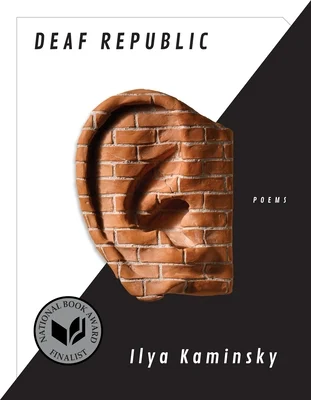 Odessa born poet Ilya Kaminsky, recently was interviewed in the New York Times and said, “Since the war began, I have received emails from journalists asking me to explain my poem “We Lived Happily During the War,” which went viral on the day Vladimir Putin’s troops began bombing my birth country.” In his conversation with Times poetry editor Victoria Chang, he said, “The hope of a poem is to help the reader to see their complicity. After all, how many wars can we live through, happily? It shows a different kind of so-called happiness.” Kaminsky’s poem is included in his latest collection Deaf Republic.
Odessa born poet Ilya Kaminsky, recently was interviewed in the New York Times and said, “Since the war began, I have received emails from journalists asking me to explain my poem “We Lived Happily During the War,” which went viral on the day Vladimir Putin’s troops began bombing my birth country.” In his conversation with Times poetry editor Victoria Chang, he said, “The hope of a poem is to help the reader to see their complicity. After all, how many wars can we live through, happily? It shows a different kind of so-called happiness.” Kaminsky’s poem is included in his latest collection Deaf Republic.
Local Iraqi-American poet Dunya Mikhail is represented inside Edward Hirsch’s stellar selection of a century’s worth of poetic works: 100 Poems that will Break Your Heart . Mikhail’s poem: “The War Works Hard”—is a poem Hirsch found filled “with fateful understanding of what war does to people, those who kill and those being killed,” and how Mikhail closes in on war with “a new kind of anti-war poem”—sardonic and filled with irony. “It approaches the subject of violent destruction,” said Hirsch, “with cutting wit, fierce humor, and brave humanity.” Mikhail’s revolutionary poetry can be found in the collection: The War Works Hard.
The Ukrainian National Anthem was first written down in 1862 by the poet Pavlo Chubynsky. The first verse of the lyrics translate roughly:
Nay, thou art not dead, Ukraine, see, thy glory’s born again,
And the skies, O brethren, upon us smile once more!
As in Springtime melts the snow, so shall melt away the foe,
And we shall be masters in our own home.
The Books noted in “Readings on War & Hope” are linked to our Bookshop affiliate page and are also stocked at Book Beat, or can be ordered from us directly if out-of-stock. Please call us at (248) 968-1190 for more info. Thank you!
White Guard by Mikhail Bulgakov/
Yale University Press 
Mikhail Bulgakov’s semi-autobiographical first novel, is the story of the Turbin family in Kiev in 1918. Alexei, Elena, and Nikolka Turbin have just lost their mother–their father had died years before–and find themselves plunged into the chaotic civil war that erupted in the Ukraine in the wake of the Russian Revolution. In the context of this family’s personal loss and the social turmoil surrounding them, Bulgakov creates a brilliant picture of the existential crises brought about by the revolution and the loss of social, moral, and political certainties.
I Will Die In A Foreign Land by Kalani Pickhart,Two Dollar Radio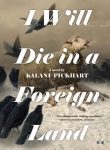
Kalani Pickhart’s timely debut novel, I Will Die In a Foreign Land, is about the 2014 Ukrainian revolution which provided a pretense for Russia to annex Crimea. The story follows the experiences of several characters whose lives intersect as the country’s political situation deteriorates. There’s a Ukrainian-American doctor, an old KGB spy, a former mine worker, and others, and these episodes are interspersed with folk songs, news reports and historical notes. The effect–kaleidoscopic but never confusing–provides an intimate sense of a country convulsing, mourning, and somehow surviving.
The Origins of Totalitarianism by Hannah Arendt, Mariner Books
Arendt’s classic exploration of the institutions and operations of totalitarian movements, focusing on the two genuine forms of totalitarian government in our time–Nazi Germany and Stalinist Russia–which she adroitly recognizes were two sides of the same coin, rather than opposing philosophies of Right and Left. From this vantage point, she discusses the evolution of classes into masses, the role of propaganda in dealing with the non-totalitarian world, the use of terror, and the nature of isolation and loneliness as preconditions for total domination.
Secondhand Time: The Last of the Soviets by Svetlana Alexievich, Random House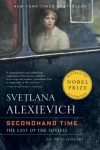
Alexievich chronicles the demise of communism. Everyday Russian citizens recount the past thirty years, showing us what life was like during the fall of the Soviet Union and what it’s like to live in the new Russia left in its wake. Through interviews spanning 1991 to 2012, Alexievich takes us behind the propaganda and contrived media accounts, giving us a panoramic portrait of contemporary Russia and Russians who still carry memories of oppression, terror, famine, massacres–but also of pride in their country, hope for the future, and a belief that everyone was working and fighting together to bring about a utopia.
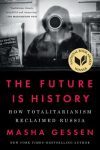 The Future is History: How Totalitarianism Reclaimed Russia by Masha Gessen, Riverhead Books
The Future is History: How Totalitarianism Reclaimed Russia by Masha Gessen, Riverhead Books
Gessen follows the lives of four people born at what promised to be the dawn of democracy. Each of them came of age with unprecedented expectations, some as the children and grandchildren of the very architects of the new Russia, each with newfound aspirations of their own–as entrepreneurs, activists, thinkers, and writers, sexual and social beings. Gessen charts their paths against the machinations of the regime that would crush them all, and against the war it waged on understanding itself, which ensured the unobstructed reemergence of the old Soviet order in the form of today’s terrifying and seemingly unstoppable mafia state.
Surviving Autocracy by Masha Gessen/ Riverhead Books
This incisive book provides an essential guide to understanding and recovering from the calamitous corrosion of American democracy over the past few years. Thanks to the special perspective that is the legacy of a Soviet childhood and two decades covering the resurgence of totalitarianism in Russia, Masha Gessen has a sixth sense for the manifestations of autocracy–and the unique cross-cultural fluency to delineate their emergence to Americans.
The Man Without A Face: The Unlikely Rise of Vladimir Putin by Masha Gessen, Riverhead Books
The Man Without a Face is the chilling account of how a low- level, small-minded KGB operative ascended to the Russian presidency and, in an astonishingly short time, destroyed years of progress and made his country once more a threat to her own people and to the world. As a journalist living in Moscow, Masha Gessen experienced this history firsthand, and for The Man Without a Face she has drawn on information and sources no other writer has tapped. Her account of how a faceless man maneuvered his way into absolute–and absolutely corrupt–power is the definitive biography of Vladimir Putin.
Red Famine by Anne Applebaum, Anchor Books
In 1929 Stalin launched his policy of agricultural collectivization–in effect a second Russian revolution–which forced millions of peasants off their land and onto collective farms. The result was a catastrophic famine, the most lethal in European history. At least five million people died between 1931 and 1933 in the USSR. But instead of sending relief the Soviet state made use of the catastrophe to rid itself of a political problem. In Red Famine, Anne Applebaum argues that more than three million of those dead were Ukrainians who perished not because they were accidental victims of a bad policy but because the state deliberately set out to kill them. Devastating and definitive, Red Famine captures the horror of ordinary people struggling to survive extraordinary evil.
“Applebaum’s account will surely become the standard treatment of one of history’s great political atrocities . . . She re-creates a pastoral world so we can view its destruction. And she rightly insists that the deliberate starvation of the Ukrainian peasants was part of a larger [Soviet] policy against the Ukrainian nation . . . To be sure, Russia is not the Soviet Union, and Russians of today can decide whether they wish to accept a Stalinist version of the past. But to have that choice, they need a sense of the history. This is one more reason to be grateful for this remarkable book.”
—Timothy Snyder, Washington Post
“Lucid, judicious and powerful . . . The argument that Stalin singled out Ukraine for special punishment is well-made . . . [An] excellent and important book.”
—Anna Reid, Wall Street Journal
Road to Unfreedom by Timothy Snyder/ Tim Duggan Books
In this forceful and unsparing work of contemporary history, based on vast research as well as personal reporting, Snyder goes beyond the headlines to expose the true nature of the threat to democracy and law. To understand the challenge is to see, and perhaps renew, the fundamental political virtues offered by tradition and demanded by the future.
“A brilliant and disturbing analysis, which should be read by anyone wishing to understand the political crisis currently engulfing the world.” —Yuval Noah Harari, author of Sapiens
“The Road to Unfreedom offers a brief, potent and carefully documented history of Vladimir Putin’s consolidation of power in Russia, Russia’s invasion of Ukraine, and Russian meddling in the 2016 U.S. presidential election.” —The Chicago Tribune
 Memories: From Moscow to the Black Sea
Memories: From Moscow to the Black Sea
By Teffi/ NYRB
WINNER OF THE 2018 READ RUSSIA PRIZE AND THE PUSHKIN HOUSE BEST BOOK IN TRANSLATION IN 2017
“This new translation…. of [Teffi’s] autobiographical work is a solid reintroduction to her charmingly Chekhovian voice… it is that juxtaposition of the frightful and the comical that brings Teffi’s work to its perfection….Readers who enjoy the acerbic and ironic tone of David Sedaris and the humane observations of Anton Chekhov should find themselves in familiar company with this work.”
—Library Journal
“Light, witty and elegiac all at once.”
—John Gray, The Guardian
“Despite the backdrop of terror, war, death and loss, Teffi’s world becomes somewhere we do not want to leave…Teffi, somehow, makes some of the bleakest years of Russian history brighter; the country shrinks to the size of a village in which its occupants are a community, living, working together and helping each other.”
—Claire Kohda Hazelton, The Guardian
“A carefully constructed, imaginative, and richly poetic narrative.”
—Maria Bloshteyn, Los Angeles Review of Books
“The memoir [Memories] would be fascinating under any circumstances, but it has special poignancy now, when millions of Ukrainians have been displaced by a conflict that is half tragedy and half farce.”
—Sophie Pinkham, The New Yorker
Bloodlands

by Timothy Snyder/ Basic Books
(new revised edition available April 26)
Bloodlands is a new kind of European history, presenting the mass murders committed by the Nazi and Stalinist regimes as two aspects of a single history, in the time and place where they occurred: between Germany and Russia, when Hitler and Stalin both held power. Assiduously researched, deeply humane, and utterly definitive,Bloodlands will be required reading for anyone seeking to understand the central tragedy of modern history. Bloodlands won twelve awards including the Emerson Prize in the Humanities, a Literature Award from the American Academy of Arts and Letters, the Leipzig Award for European Understanding, and the Hannah Arendt Prize in Political Thought.
“A startling new interpretation of the period … a stunning book.”—David Denby, New Yorker
“A superb and harrowing history.”—Financial Times
“Genuinely shattering…. I have never seen a book like it.”—Istvan Deak, New Republic
 Between Two Fires: Truth, Ambition, and Compromise in Putin’s Russia by Joshua Yaffa/ Crown Publishing
Between Two Fires: Truth, Ambition, and Compromise in Putin’s Russia by Joshua Yaffa/ Crown Publishing
In this rich and novelistic tour of contemporary Russia, Joshua Yaffa introduces readers to some of the country’s most remarkable figures–from politicians and entrepreneurs to artists and historians–who have built their careers and constructed their identities in the shadow of the Putin system. Torn between their own ambitions and the omnipresent demands of the state, each walks an individual path of compromise. Some muster cunning and cynicism to extract all manner of benefits and privileges from those in power. Others, finding themselves to be less adept, are left broken and demoralized. What binds them together is the tangled web of dilemmas and contradictions they face.
Agent Sonya by Ben MacInyre/ Crown Publishing
This true-life spy story is a masterpiece about the woman code-named “Sonya.” Over the course of her career, she was hunted by the Chinese, the Japanese, the Nazis, MI5, MI6, and the FBI–and she evaded them all. Her story reflects the great ideological clash of the twentieth century–between Communism, Fascism, and Western democracy–and casts new light on the spy battles and shifting allegiances of our own times.
Winter is Coming by Gary Kasparov, Public Affairs 
The stunning story of Russia’s slide back into a dictatorship-and how the West is now paying the price for allowing it to happen. The ascension of Vladimir Putin-a former lieutenant colonel of the KGB-to the presidency of Russia in 1999 was a strong signal that the country was headed away from democracy. Yet in the intervening years-as America and the world’s other leading powers have continued to appease him-Putin has grown not only into a dictator but an internationalthreat. With his vast resources and nuclear arsenal, Putin is at the center of a worldwide assault on political liberty and the modern world order.
Putin’s World: Russia Against The West And With The Rest by Angela Stent/ Twelve 
From renowned foreign policy expert Angela Stent comes a dissection of how Putin created a paranoid and polarized world — and increased Russia’s status on the global stage. How did Russia manage to emerge resurgent on the world stage and play a weak hand so effectively? Is it because Putin is a brilliant strategist? Or has Russia stepped into a vacuum created by the West’s distraction with its own domestic problems and US ambivalence about whether it still wants to act as a superpower?
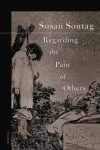 Regarding the Pain of Others
Regarding the Pain of Others
by Susan Sontag/ Picador USA
One of the greatest critics of her generation delivers an extended study of human violence, reflecting on a question first posed by Virginia Woolf: How in your opinion are we to prevent war? How does the spectacle of the sufferings of others (via television or newsprint) affect us? Are viewers inured—or incited—to violence by the depiction of cruelty? In Regarding the Pain of Others, Susan Sontag takes a fresh look at the representation of atrocity—from Goya’s The Disasters of War to photographs of the American Civil War, lynchings of blacks in the South, and the Nazi death camps, to contemporary horrific images of Bosnia, Sierra Leone, Rwanda, Israel and Palestine, and New York City on September 11, 2001.
In Regarding the Pain of Others Susan Sontag yet again changes the way we think about the uses and meanings of images in our world.
“Wise and somber…Sontag’s closing words acknowledge that there are realities which no picture can convey.”—Los Angeles Times Book Review
“Bristles with a sense of commitment—to seeing the world as it is, to worrying about the ways it is represented, even to making some gesture in the direction of changing it…the performance is thrilling to witness.”—The New York Times Magazine
“A fiercely challenging book…immensely thought-provoking.”—The Christian Science Monitor
 Three Guineas
Three Guineas
By Virginia Woolf/ Mariner Books
“Though we see the same world, we see it through different eyes.”
Setting out to answer the question “How are we to prevent war?” Virginia Woolf argues that the inequalities between women and men must first be addressed. Framing her arguments in the form of a letter, Woolf wittily ponders to whom–among the many who have requested it–she will donate a guinea. As she works out her reasons for which causes she will support, Woolf articulates a vision of peace and political culture as radical now as it was when first published on the eve of the Second World War. A founding text of cultural theory, Three Guineas can also help us understand the twenty-first-century realities of endless war justified by “unreal loyalties.”
“Witty, scornful, deeply serious…If you are a woman, or anti-war, or both, read it.”–The New Yorker
“There are three main lessons that I take away from Woolf’s essay which inspire me as a peace activist some 77 years on from its 1938 publication. The first relates to the relationship between culture, capital and war; the second to women’s private and public experience of conflict and oppression; and the third to the relationship between conflict and patriotism. The essay reminds us that war cannot be stopped by the international actors alone, but requires a systematic shift in discourse and power in democracy domestically as well as abroad.”–Women’s power to stop war: rereading Virginia Woolf
 Podcasts and Resources
Podcasts and Resources
Fiona Hill on the War Putin Is Really Fighting, via The Ezra Klein Show (an audio podcast).
Mary Margaret Serpento sent us the following: Resources for the Penn State community about the Russian invasion of Ukraine
This guide provides context to the culture and history of Ukraine and Russia, Ukrainian and Russian news sources, Russian-Ukraine conflict maps, and Ukrainian libraries and cultural heritage. Resources for the critical review of news and media sources provide suggestions for the verification of information. The “Penn State responds” section summarizes Penn State activities and statements regarding the Russian invasion of Ukraine (2022).
“Today, turning to art is perhaps the only way to sustain inner sanity in an insane world.” –Hammid Dabashi, professor of Iranian Studies at Columbia from his article: Whom to believe on Ukraine: Biden, Putin, or Nikolai Gogol? found in Al Jazeera
Ukraine Interactive Map
Place names in English and Cyrillic. Has newsfeed sidebar in English.
Helping Ukraine
United Nations World Food Program
CBS news site on Ways to Help Ukraine
The Harvard Ukrainian Studies is an online arts and lit journal published by the Ukrainian Research Institute at Harvard University. They’ve also posted a list of resources on how to help Ukraine.
Old Lion, a Ukrainian book publisher in Lviv has begun a donation drive to put books in the hands of children refugees.”The Old Lion Publishing House will use the funds raised to select books that meet the needs of shelters and support centers from different countries (Poland, Slovakia, the Czech Republic, Lithuania, Latvia, etc.) and send these books to places where they are most needed.” –Books for Ukrainian refugees

